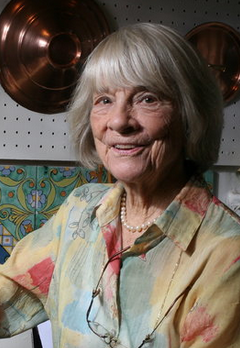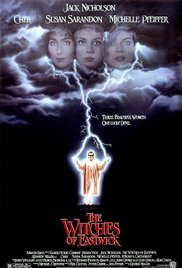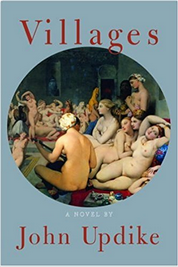 Judith Jones, who retired as senior editor and vice president at Alfred A. Knopf in 2011 after a 54-year career at the fabled publishing house, died Wednesday, August 2, at the age of 93 as a result of complications from Alzheimer’s disease, according to a New York Times story by Robert D. McFadden.
Judith Jones, who retired as senior editor and vice president at Alfred A. Knopf in 2011 after a 54-year career at the fabled publishing house, died Wednesday, August 2, at the age of 93 as a result of complications from Alzheimer’s disease, according to a New York Times story by Robert D. McFadden.
Although Ms. Jones was most famous for discovering Julia Child and co-writing three books of her own with her food-critic husband Evan, devoted readers of John Updike knew her as the two-time Pulitzer Prize-winning author’s editor responsible for shepherding “all but one of Mr. Updike’s scores of books of fiction, short stories, poetry and essays to publication.”
Ms. Jones was also responsible for the publication of the American version of Anne Frank: The Diary of a Young Girl while she worked in Doubleday’s Paris office prior to joining Knopf. Among her many honors was the James Beard Lifetime Achievement Award, named for another writer she edited during her distinguished career at Knopf. While at Knopf Ms. Jones also “commissioned and edited regional and ethic food books for the ‘Knopf Cooks American’ series.” Among other writers she edited were Anne Tyler, John Hersey, Elizabeth Bowen, Peter Taylor, and William Maxwell. But it was her working relationship with Updike, Knopf’s most successful and lauded author, that put her in the conversation of important authors and their equally important editors. One hopes that her correspondence with Updike will one day be published, as the Max Perkins/Ernest Hemingway letters have been, so readers can get a fuller understanding of their working relationship.
The literary world has lost another one of its giants, but she will be appreciated well into the future. Photo: Chester Higgins Jr./The New York Times.
“Judith Jones, editor of Julia Child, dead at 93” (AP)
“The Side of Judith Jones You Didn’t See” (Food 52)
“Judith Jones got the best out of her authors. I know: I was one of them” (Washington Post)
“Remembering Culinary Giant Judith Jones” (Daily Beast)
 Sean Wilson, writing for Den of Geek!, recently considered “The 15 greatest John Williams scores you’ve forgotten about,” and ranked Williams’ score of the 1970 screen adaptation of Jane Eyre as the composer’s most underrated score . . . with his 1987 score to the film version of John Updike’s The Witches of Eastwick coming in a close second.
Sean Wilson, writing for Den of Geek!, recently considered “The 15 greatest John Williams scores you’ve forgotten about,” and ranked Williams’ score of the 1970 screen adaptation of Jane Eyre as the composer’s most underrated score . . . with his 1987 score to the film version of John Updike’s The Witches of Eastwick coming in a close second.

